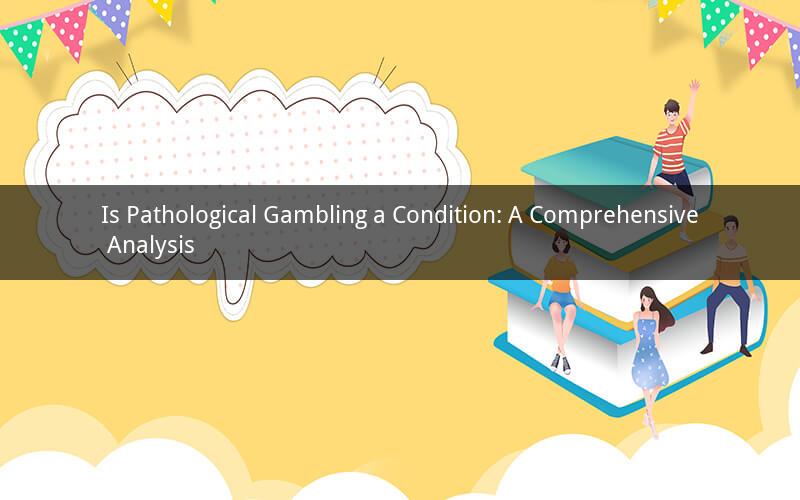
Pathological gambling, also known as gambling addiction, has become an increasingly prevalent issue in society. Many people question whether pathological gambling should be considered a condition. In this article, we will delve into the definition, causes, symptoms, diagnosis, and treatment of pathological gambling, providing a comprehensive analysis of whether it should be categorized as a condition.
I. Definition of Pathological Gambling
Pathological gambling refers to an impulse-control disorder characterized by uncontrollable gambling behavior. It is characterized by repeated, unsuccessful efforts to control, reduce, or stop gambling, along with the occurrence of one or more of the following criteria:
1. Needs to gamble with increasing amounts of money to achieve the desired excitement.
2. Restlessness or irritability when attempting to stop gambling.
3. Gambles to escape problems or relieve feelings of guilt, anxiety, or depression.
4. After losing, often returns to try to win back the money, with the belief that the next time will be lucky.
5. Lying to conceal the extent of involvement with gambling.
6. Use of money intended for personal, family, or household needs for gambling.
7. Gambles to finance basic living expenses after running out of money from other sources.
II. Causes of Pathological Gambling
The causes of pathological gambling can be divided into two main categories: biological and environmental factors.
1. Biological Factors
a. Brain chemistry: Research shows that pathological gamblers may have altered levels of neurotransmitters in the brain, particularly those involved in pleasure and reward.
b. Genetics: Family history may play a role in the development of pathological gambling. Studies indicate that genetic factors can account for up to 50% of the risk.
2. Environmental Factors
a. Early exposure to gambling: Individuals who are exposed to gambling at an early age are more likely to develop gambling problems later in life.
b. Psychological factors: Depression, anxiety, and other mental health issues can increase the risk of pathological gambling. People may turn to gambling as a way to cope with their emotional difficulties.
III. Symptoms of Pathological Gambling
Pathological gambling exhibits a range of symptoms, including:
1. Preoccupation with gambling: Thoughts about gambling may consume a significant portion of an individual's time, making it difficult to focus on other aspects of life.
2. Loss of control: Despite attempts to stop, individuals with pathological gambling find it challenging to control their gambling behavior.
3. Repeated failures to stop gambling: Attempts to stop or control gambling often result in failure, leading to continued involvement with the activity.
4. Lying: Pathological gamblers often lie to friends, family, or therapists about their gambling habits.
5. Increased time spent gambling: Work, social, and family responsibilities may be neglected as a result of excessive gambling.
6. Borrowing money to gamble: Individuals may resort to borrowing money from others or taking out loans to fund their gambling habits.
7. Consequences of gambling: The individual may face financial, legal, or social consequences due to their gambling, but continues to engage in the behavior.
IV. Diagnosis of Pathological Gambling
Pathological gambling is diagnosed based on the Diagnostic and Statistical Manual of Mental Disorders (DSM-5), which lists ten criteria. A healthcare professional may diagnose pathological gambling if the individual exhibits at least five of these criteria.
V. Treatment of Pathological Gambling
Treatment for pathological gambling may involve various approaches, including:
1. Cognitive-behavioral therapy (CBT): CBT helps individuals identify and change their gambling-related thoughts and behaviors.
2. Medications: Certain medications, such as antidepressants or mood stabilizers, may be prescribed to help manage underlying mental health issues.
3. Support groups: Support groups like Gamblers Anonymous provide individuals with a safe and supportive environment to share their experiences and receive guidance.
4. Financial counseling: Individuals may benefit from financial counseling to address their gambling-related debt and develop strategies to prevent future financial issues.
5. Aftercare: After completing treatment, ongoing support and aftercare programs are essential to prevent relapse and promote long-term recovery.
In conclusion, pathological gambling is a complex condition with a variety of underlying causes and symptoms. While the debate over whether it should be categorized as a condition persists, the available evidence suggests that pathological gambling is a genuine mental health issue. Recognizing it as a condition can help individuals seek appropriate treatment and support, ultimately leading to better outcomes for those affected.
Questions and Answers:
1. Q: What is the primary cause of pathological gambling?
A: The primary cause of pathological gambling is a combination of biological and environmental factors, including brain chemistry, genetics, early exposure to gambling, and psychological factors like depression or anxiety.
2. Q: How is pathological gambling different from recreational gambling?
A: Pathological gambling is characterized by uncontrollable gambling behavior, leading to significant negative consequences in an individual's life. Recreational gambling, on the other hand, is a leisure activity that individuals can engage in without negative consequences.
3. Q: Can pathological gambling be treated?
A: Yes, pathological gambling can be treated using various approaches, such as cognitive-behavioral therapy, medications, support groups, financial counseling, and aftercare programs.
4. Q: Is there a genetic link to pathological gambling?
A: Yes, research suggests that genetic factors can account for up to 50% of the risk for developing pathological gambling.
5. Q: Can pathological gambling lead to financial problems?
A: Yes, pathological gambling can lead to significant financial problems, including debt, bankruptcy, and the loss of assets. It is crucial for individuals struggling with pathological gambling to seek treatment and financial counseling to address these issues.